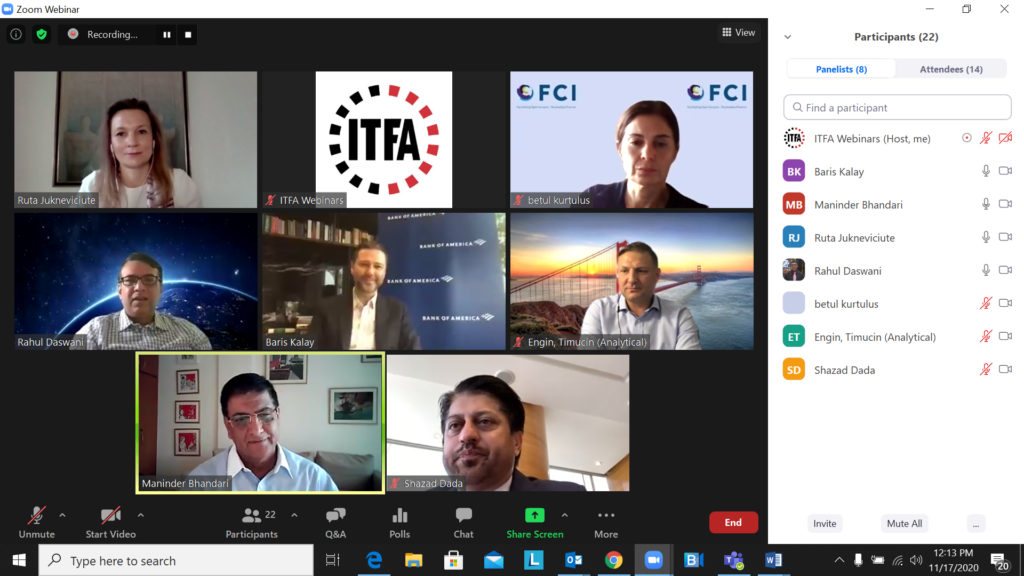-
 ITFA represents the rights and interests of banks, financial institutions and service providers involved in trade risk and asset origination and distribution.Our Mission
ITFA represents the rights and interests of banks, financial institutions and service providers involved in trade risk and asset origination and distribution.Our Mission
On November 17th 2020, the ITFA Middle East Regional Committee, currently chaired by Ms. Naura Hussain, SRM, Financial Institutions International at UBL Dubai, organized in collaboration with Global Trade Review ‘GTR’, the 3rd trade finance roundtable, hosted virtually out of Dubai.
The virtual roundtable addressed the broader issues of the changing dynamics in trade finance in the MENA region, with an emphasis on the impact of Covid-19 on the latter as well as the advents in digitalization of trade and increased focus on ESG.
Mr Maninder Bhandari, GTR MENA, kicked off the discussion by introducing all 6 participants to the roundtable, which included:
The first segment of the discussion focused on the regional dynamics of trade finance, with Mr Dada touching on the positive trends that have come out of this challenging year, specifically as it relates to the Regional Comprehensive Economic Partnership ‘RCEP’. The reversal of protectionism (seen throughout this pandemic), and new regional trade initiatives (such as RCEP) to assist the critically-required post pandemic recovery between countries and their trading partners will support the post-pandemic recovery and promote economic resilience globally.
Mr Kalay went on to address the fragmented nature of trade cooperation, due to the complex regulatory and local/regional dynamics which prevent larger, ‘blanket-type’ global agreements from being pursued or signed. He went on to highlight that in effect, the reality is such that regional agreements are more quickly implemented and help foster growth, and are thus by default the more popular and visible cooperations.
Mr Engin shared interesting statistics around the impact of Covid-19, stating that since the start of the year there has been visible pressure on revenue and EBITDA generation, profitability with almost 55% of S&P portfolio in terms of the corporate ratings in the region subject to some type of negative rating action this year. In terms of the corporate behavior, Mr Engin added that revenues have come down which cannot be controlled but what can be is liquidity, cash flows and capital expenditures, so a key focus for most players is managing the cost space.
Ms Kurtulus touched upon the stalled recovery due to the impact of the second wave of the virus that has hit some global markets harder than others, specifically the ones that are oil-revenue dependent. There were expectations for negative growth for 2020 with any hope for recovery in last quarter carried over to 2021. Ms Kurtulus shared interesting statistics within FCI where 89% of their members are bank or bank-owned factoring companies generating a total turnover of $ 2.7 Trillion whereas total globally estimated receivable trade finance market was $5 trillion dollar for the world. The demand for factoring solutions has seen an exponential increase across all regions which has been difficult for banks and NBFI’s to accommodate.
Another interesting trend that has emerged as a result was the spend on the technology side that many corporates and banks have seen, according to Mr Daswani, and the positive impact it had for some tech companies such as Microsoft. He also reiterated what has been stated previously, in that Asia for example has recovered better than other harder hit economies such as those of Europe and the US. Ms Jukneviciute also stressed the move towards digitalization driven by necessity – but also highlighted the flipside in that “that transformation of this magnitude will be long and difficult and it will require cross-organizational coordination before the benefits can be realized fully”.
Mr Dada concluded this first segment of the roundtable by hitting on some of the positive aspects of Covid-19, in that the review of the global supply chains has led to the emergence of new local supply chains and has diluted some of the previous “supply-side” concentration risks which were previously ignored. To this end, Covid-19 has been a blessing in disguise for the region since it drives more effective cash and cost culture at companies, regardless of size and sector, and a review of the operating model in place to sometimes a more efficient and locally-benefiting one.
On digitization, Mr Kalay highlighted that while Covid-19 has precipitated the latter, the complexity of trade as a product renders a more tempered change “because it is not only a question of technology, it’s also involves regulation and legal requirements”. Mr Daswani believes that digitization in trade is more likely to be adopted by the corporate segment as opposed to the banking sector, given the need for speedy and immediate peer-to-peer exchange.
Ms Jukneviciute touched on the advents made at her firm, specifically on the treasury side with the implementation of new online treasury management systems, and the adoption of digital technology has effectively forced some of the local banks to keep pace. The different digitalization approaches adopted by the varying segments, as well as the number of players on the fintech side, has also stressed the fragmentation faced on the digital front – Ms Kurtulus highlighted the need for a cohesive regulatory and legal environment and platforms to speak to one another for a seamless, risk-free adoption of digitalization in trade finance. Mr Dada concurred, taking it one step further by addressing the importance of being agile and rapid on the decision-making front on the policymakers’ side. While the latter were very collaborative in navigating the crisis via emergency measures (loan deferrals, payroll financing, export driven financing at low rates), the streamlining of digital platform adoption and centralized database has been near impossible. Mr Kalay did point out subsequently, that fintechs and banks are collaborating more than ever and working together to develop client solutions. Mr Daswani stated that the digital approach tends to take two forms: multiple providers service a client and thus the client builds and internal mechanism for managing the numerous platforms; or the clients themselves build their own platform (more costly) and pushed providers to plug into it.
On ESG, all participants agreed that there has been a grassroots change in the mindset of corporates and stakeholders alike, in wanting to fund and invest in sustainable and ethical businesses precipitated by two main factors: one being financial, in that ESG-strong companies are less likely to face punitive measures in the future on their business activities (thus more appealing to investors and banks alike), and the other being more of a community-driven ethos, supported by the new generation (and as highlighted by Ms Kurtulus), to focus on companies with strong governance in place from en environmental and social perspective. Mr Engin highlighted the lack of standardization on the ESG side and what KPIs should be tracked, but that corporates are reporting their sustainability practices to their investor base/market and beefing up their investor relations teams to specifically address their ESG practices, concurred by Mr Daswani.
Mr Kalay took it one step further, in that some companies have revisited their supply chain programmes to look for more sustainable long-term solutions (such as moving them closer/localizing them, or only transacting with companies with ESG metrics in place) – while the Environmental component has been the larger focus so far, the Social and Governance aspects are also rapidly coming to the forefront, in part due to Covid-19.
The discussion provided a valuable platform for insight from key and varied industry players to highlight the rapid and unprecedented shifts which have taken place globally. This year has witnessed a precipitated advancement and inclusion of digitalization in trade finance and supply chain, bolstered by the support from regulatory bodies; and the adoption of ESG in the trade finance world, as the latter evolves into the new socially conscious reality.

Privacy Policy | Cookie Policy
Designed and produced by dna.studio